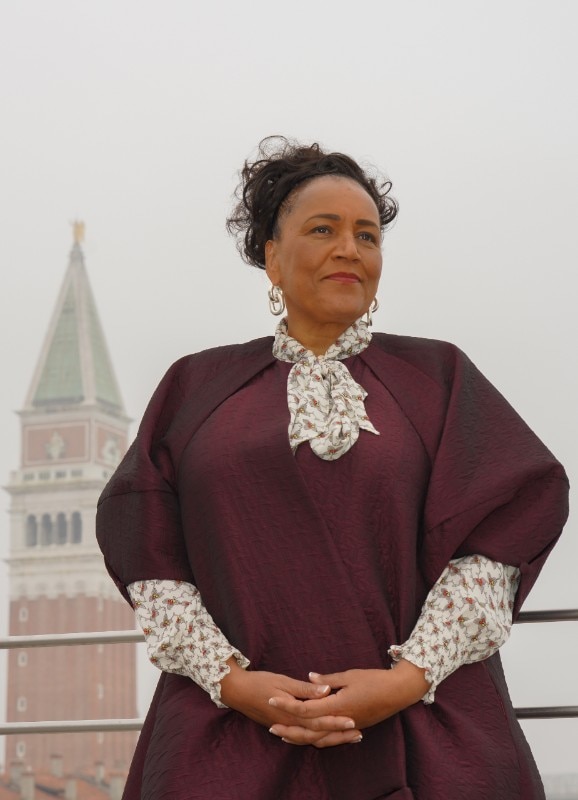This interview is published in Domus 1079, on newsstands in May 2023.
“It was a surprise and I’m grateful for it. When you’re almost 60, it’s rare to see your life expand. This happened to me thanks to the Venice Biennale, which literally transformed me.” Lesley Lokko turns up 15 minutes early for our appointment. She’s an architect, teacher and social activist, as well as the author of bestsellers that have stirred discussion, because they say little about architecture and a lot about race, identity, emotions and eros in an increasingly globalised society. Lokko’s architectural thinking also embraces the postcolonial themes of intellectuals such as Edward Said, Gayatri Chakravorty Spivak, Chinua Achebe and V.S. Naipaul. Opening a path that culminates here, at the Venice Biennale’s 18th International Architecture Exhibition.
Let’s start from here. You live in Accra, but you’ve lived in Dundee, London, Oxford, Ames, New York, Chicago, Edinburgh and Johannesburg. How have these months in Venice affected you?
Lesley Lokko There’s nothing like Venice anywhere. This is why millions of people visit it from around the world. But living here is different. Venice has a magical dimension. It suspends the relationship with the real world, and it makes an incredible thing happen.
What’s the amazing thing?
You spend very little! (She smiles). Now that I’ve got into the rhythm of the city, looking at my bank account is always a surprise.
Why is Venice cheap?
Venice is full of global tourists but it’s actually very local. It’s definitely a city but different from the established idea of the city, defined by the display-retail axis, a place where everything is sold 24 hours a day. In Venice there are very few temptations to buy, apart from carnival masks and Murano glass.
“The Laboratory of the Future” is a challenging title. Especially since architecture is not an unambiguous term.
True. Architecture means different things in different contexts. In the global North or West it’s a high and refined part of the conversation, but in other parts of the world far from it. In cities like London, Milan or New York, architecture is a broad category, which has to do with schools, homes, hospitals and above all an idea of civilisation. But in Africa it’s not clear what it is. It’s less well understood. There isn’t even a word to express the concept of “architecture”. But it’s definitely about individual homes and for this reason there’s a sense of counterintuitive optimism, a building site that is looking to the future.

Counterintuitive optimism?
If architecture isn’t clear in its meaning, there’s faith, there’s trust, there’s effort. And a great chance to reinvent the world, to be an agent of change.
This is the other concept of your Biennale. But what does it mean to be an agent of change in a hyperfluid world?
While I was working on the exhibition, I wondered if events like those organised by the Biennale, and architecture in general, are justified in terms of carbon emissions and costs. When I announced the title a year ago, I was thinking of a “narrative” that evolved in space. Today my vision is very different, with the Biennale both a moment and a process. It borrows structure and format from art exhibitions, but it’s distinguished by critical factors that are neglected, such as issues related to production, resources, rights and risks. That’s why the spotlight is on Africa, or rather that fluid and entwined culture of people of African origin that now embraces the globe.
Speaking of Africa, in your Biennale, for the first time there’s a lot of it. Too much perhaps?
Africa is the youngest continent in the world, with an average age half that of Europe and the United States, and a decade younger than Asia. It’s also the continent with the fastest rate of urbanisation, almost 4 per cent a year. This rapid, largely unplanned growth generally comes at the expense of the environment and local ecosystems, raising issues affecting climate change both regionally and globally.
Africa sounds like a metaphor, where all issues related to equity, resources, race, fear and hope merge.
It is. Today we’re all Africans, as what happens in Africa happens to everyone.
So architecture is a metaphor, too?
Two metaphors, because architecture is at least two things: a profession and a discipline. And there’s a big difference between them. The discipline is broader, it influences the world and has to do with philosophers, journalists, critics, politicians and civil servants. The profession is narrower and part of risk management or risk mitigation, in a world that’s becoming incredibly risky. The architect’s profession is one of the most vulnerable today, because what they do is endangered by the fluid world. And vice versa.

But architecture is increasingly also communication of architecture. For Domus this meant a redesign of its method and purpose, because the traditional ones had been overtaken by the evolution of studies and exhibitions on a global level.
That's an interesting point. I would answer by talking about my experience in the United States, where I lived three times for long periods. Each time I had an anguished feeling that I didn't know how to define. In the end, I realized that it was the “transaction”, which basically simply means that somehow someone there is selling you something, on all levels. I’m not saying that this exists only in the United States, but it’s much more evident there than elsewhere.
The Architecture Biennale is research but it was founded as a communication project. Does the Biennale take part in the same transaction?
Of course the Biennale also “sells” something, but what it sells does not belong to the commercial dimension, which is perhaps more evident in the Art Biennale because art always has to do with “physical works”. Communication, on the other hand, today in architectural firms is central to selling projects. There’s nothing wrong with this, but it’s a very different communication from events like those organised by the Biennale, which also has to sell tickets but this is not its main purpose.
Can you imagine how you will feel after the Biennale?
One word: tired. But also deeply grateful because this experience has changed the way I see the world, not just architecture.
One last question. Who did you think of when organising the Biennale?
I thought of my father, who raised me by telling me that when we do a job we always have to put everything into it. And I thought of my editor, who reads my books and decides whether to publish them. When I first met him he told me: “Never think about who will read you because you risk losing your voice.” I listened to both of them and now inside me, deep down, I know that I couldn't have done more than that.
Opening image: Illustration by Felix Petruška

Metamorphosis: when ceramics lives with technology
Iris Ceramica Group presents "Metamorphosis" at Fuorisalone 2025, an experience that merges art and technology, featuring interactive installations and innovative surfaces.




